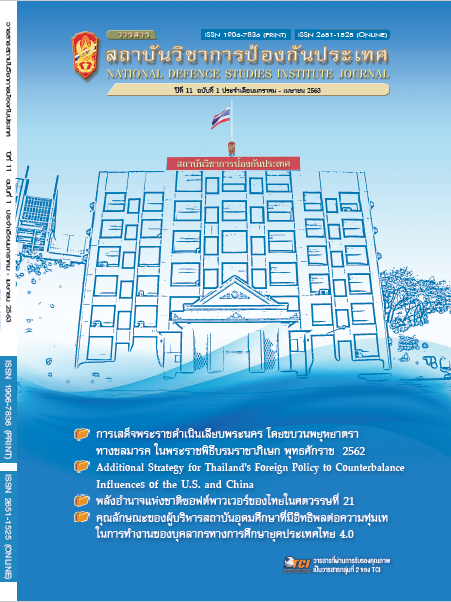Samurai Leadership: A Case Study of Kazuo Inamori
Main Article Content
Abstract
This research is to study the biography and working style of Kazuo Inamori and guidelines for managing business organizations in the case of Japan Airlines, which he has led the business organization to overcome the bankruptcy crisis of the company within 3 years. This research was a qualitative research using documentary research through the use of unstructured interview technique which was one method of collecting data used in this research.
The research’s results indicated that there were 4 majors of principles and philosophy of Kazuo Inamori administration: 1) To change the desire to become reality and the effort to make ordinary people become special people which had a good personality that committed to the work and dedicated to achieve the goal. 2) Organization management did not require many documents and protocol. 3) The management realized in the same philosophy: the duty of the management was to make all employees in a fine state physically and mentally. and, 4) Good leaders must be knowledgeable about financial information. There are 2 suggestions as follows: 1) The concept and work philosophy of Kazuo Inamori should be created to a learning process for dissemination to Thai society. 2) Should adopt good management principles, transparency, sacrifice and efficiency of Kazuo Inamori to develop in knowledge management (KM) for government organizations, private sector and other civil society organizations.
Article Details
The articles, images, tables, graphs, written content, and opinions published in this journal are solely those of the authors and do not necessarily reflect the views or positions of the National Defence Studies Institute or its academic affiliates.
References
ทิพวรรณ อภิวันท์วรรัตน์. (2560). Kazuo Inamori เทพแห่งการบริหารที่ยังมีชีวิตอยู่ในโลกปัจจุบัน. สถาบันการจัดการปัญญาภิวัฒน์,
สืบค้นจาก https://www.pim.ac.th/pages/inamori-kazuo/
ประยูร เชี่ยววัฒนา. (2556). Kazuo Inamori ผู้พลิกฟื้นสายการบิน JAL เมื่อสายการบินแห่งชาติ JAL ล้มละลาย. วารสารสมาคมส่ง
เสริมเทคโนโลยี ไทย-ญี่ปุ่น, 17(197), 17-19.
ผลประกอบการณ์และราคาหุ้นของเจแปน แอร์ไลน์ 2557-2561. สืบค้นจาก https://www.bloomberg.com/quote/
โยสุเกะ และ ทสมา วรรธนะภูติ. (2561). ช้าให้ชนะ หลักคิดจากเทพเจ้าแห่งการบริหารของญี่ปุ่น (พิมพ์ครั้งที่ 1). กรุงเทพฯ:
สำนักพิมพ์วีเลิร์น.
สุดารัตน์ เอื้อเปี่ยมมงคล. (2559). ถอยก็ตายวิกฤติยังไงก็ต้องสู้ (พิมพ์ครั้งที่ 1). กรุงเทพฯ: สำนักพิมพ์ สุขภาพใจ.
David Horth and Dan Buchner. (2014). How to use innovation to lead effectively, work collaboratively,
and drive results. Boston: Center for Creative Leadership and CCL, at Continuum.
David Osborne and Ted Gaebler. (1992). Reinventing Government. New York: Penguin press.
Gibson, J. L, Ivancevich, J. M., Donnelly, J. H., & Konopaske, R. (2012). Organizations: Behavior, structure,
Processes. (14th ed.). New York: McGraw-Hill Irwin.
Kazuo Inamori. (2004). Ikikata: ningen to shite ichiban taisetsu na koto. Japan: Sanmāku Shuppan Publishing.
________. (2013). Moeru Toukon. Tokyo: The Mainchi Newspapres.
_______. (1995). A Passion for Success: Practical, Inspirational, and Spiritual Insight from Japan's Leading
Entrepreneur. New York: McGraw-Hill Publishing Company.
Lewin, K., Lippitt, R., & White, R.K., (1939). Patterns of aggressive behavior in experimentally created
social climates. Journal of Social Psychology, 10, 271-301.
“Mikoshi” Management: How Kazuo Inamori Lifted Japan Airlines. (2012). The Wall Street Journal.
Naoyuki Morita, (2014). Zenin De Kasegu Soshiki. Nikkei Business Publications, Inc.
Onishi Yasuyuki, (2013). Inamori Kazuo's Last Battle-A Life on the JAL Revitalization. Nippon Keizai
Shimbun Publishing Company.
Ota Yoshihito, (2018). “The Miracle of JAL-What Kazuo Inamori Brings Good Feeling”. Japan: Chitchi
Publishing Co., Ltd.
The UN Global Compact. (2014). Corporate Sustainability in the World Economy. New York: The UN Global
Compact Office Printed at the United Nations.


